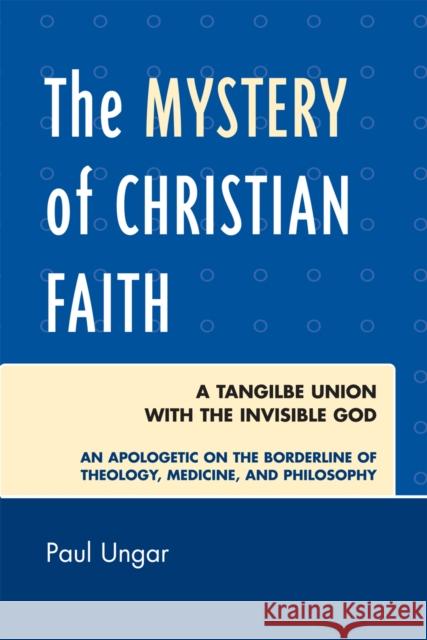The Mystery of Christian Faith: A Tangible Union with the Invisible God: An Apologetic on the Borderline of Theology, Medicine, and Philosophy » książka
The Mystery of Christian Faith: A Tangible Union with the Invisible God: An Apologetic on the Borderline of Theology, Medicine, and Philosophy
ISBN-13: 9780761839576 / Angielski / Miękka / 2008 / 424 str.
The Mystery of Christian Faith: A Tangible Union with the Invisible God: An Apologetic on the Borderline of Theology, Medicine, and Philosophy
ISBN-13: 9780761839576 / Angielski / Miękka / 2008 / 424 str.
(netto: 313,31 VAT: 5%)
Najniższa cena z 30 dni: 329,66
ok. 30 dni roboczych
Bez gwarancji dostawy przed świętami
Darmowa dostawa!
Since the time of bloody persecutions right up to the post-modern age, each historical period posed its particular challenge to Christianity. Psychologically, Christians' vitality in overcoming these challenges came primarily from what is perhaps the deepest mystery of faith itself-the believers' union with God. The postmodern positivist questions this mystery, and rejects the possibility of communication with a non-sensorial and therefore "non-existing" God. Agnostics proclaim, "One man's religion, is another's delusion." Therefore, the modern challenge for Christians is to explain how God, despite being invisible, is experientially present in the life of believers. Although the experience of living in a relationship with an invisible God is a profound one for Christians, it seems nonsensical to those who emphasize the primacy of sensory experience. Paul Ungar's extensive scholarly training equips him remarkably well to explore where, when, how, and through which psychological functions communication with the spiritual God factually occur. Ungar's The Mystery of Christian Faith: A Tangible Union with the Invisible God is an apologetic work on the borderline of theology, psychology and philosophy. It is written for Christian intellectuals regardless of their denominational background and rationally demonstrates what Francois Mauriac's hauntingly poetic expression, "Nothing is more alien than living in a Godless world, and nothing is closer to humans than God."











